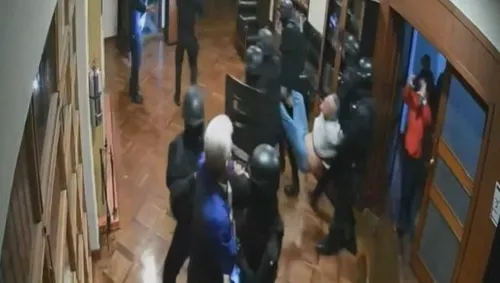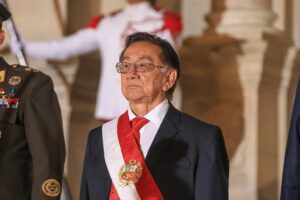
The invasion of the Mexican embassy in Ecuador by Daniel Noboa’s government generated a diplomatic crisis between the countries that will continue to unfold in the coming days in different international organizations. The case should be discussed on Friday (12) at a meeting at the Community of Latin American and Caribbean States (Celac), where possible sanctions against Ecuador will be discussed.
The president of Mexico, Andrés Manuel Lopez Obrador, reinforced this Tuesday (9) that the country will present the case before the International Court in The Hague. In Ecuador, the representative of the Citizen Revolution Movement and former Ecuadorian presidential candidate, Andrés Arauz, announced this Tuesday (9) that the topic will also be discussed by the Organization of American States (OAS) and the UN Security Council, in addition to support an impeachment request against Noboa in Ecuador.
For Guillaume Long, Ecuador’s former foreign minister and senior researcher at the Center for Economic and Policy Research in Washington (DC), the storming of the Mexican embassy represents “the most arbitrary international act that Ecuador has committed in its contemporary history.”
“Ecuador today finds itself isolated, discredited. The latest images that Mexico released and which show the violent way in which the police confronted diplomatic personnel deepen the international crisis for Ecuador”, he told Brazil in fact in relation to the internal images of the embassy, released by the Mexican president this Tuesday.
Like former president Lenín Moreno, who handed over Julian Assange, political asylum in the United Kingdom’s Ecuadorian embassy, to the British police, Long points out that Noboa also violated international asylum law. In the previous case, however, there was no aggravating factor of invading the diplomatic territory of another country.
“Unlike Noboa, the British did not violate the immunity of the Ecuadorian embassy in London because they were invited to enter by the Ecuadorian government. In the case of the assault on the Mexican embassy, the violation of the right to asylum is very clear. So, both episodes violate the institution of asylum in Latin America and the world. If today Ecuador can do this without facing consequences, tomorrow anyone can, including any dictatorship.”

Guillaume Long was Minister of Relations of Ecuador between March 2016 and May 2017 / Ministry of Foreign Affairs of Ecuador
The former Ecuadorian foreign minister believes that the International Court of Justice will rule in favor of Mexico, based on article 22 of the Vienna Convention on diplomatic relations and highlights, in the eyes of international law, that the asylum seeker Jorge Glas was kidnapped by Ecuador
“Unlike other cases that involve legal complexities, or the decision between two positions supported by law, here Ecuador has no international argument whatsoever. The argument that they did not agree with Mexico granting asylum to Glas does not justify, in international law, that the inviolability of a diplomatic headquarters could be attacked. Nothing justifies that. Therefore, it will be something simple to resolve.” Read the full interview below:
Brasil de Fato: How do you classify President Daniel Noboa’s attitude in authorizing the invasion of the Mexican embassy in Ecuador to arrest Jorge Glas?
Guillaume Long: The assault on the Mexican embassy by the Ecuadorian government is a brutal violation of the most sacred aspect of international law and peaceful coexistence between states. It’s very serious. Without a doubt, it is the most arbitrary international act that Ecuador has committed in its contemporary history.
As expected, this act is being repudiated by all countries in the international community, from the United States to Russia and the European Union. The same in Latin America: from Nicolás Maduro’s Venezuela to Javier Milei’s Argentina. And evidently, it has provoked the rejection of all regional and multilateral organizations: CELAC, the OAS, the UN.
Ecuador today finds itself isolated, discredited. The latest images that Mexico released and which show the violent way in which the police confronted diplomatic staff deepen the international crisis for Ecuador.
It is important to make it clear that in the eyes of international law, the asylum seeker Jorge Glas was kidnapped by Ecuador. The situation, in short, is very serious and will have serious consequences for Ecuador.
In response, Mexico severed diplomatic relations with Ecuador and must file a complaint with the International Court of Justice for violation of political asylum. What consequences could this have for Ecuador from a diplomatic point of view?
The International Court of Justice will rule in favor of Mexico in its claim, given the clarity of the case. This involves applying article 22 of the Vienna Convention on diplomatic relations. Unlike other cases that involve legal complexities, or deciding between two positions supported by law, here Ecuador does not have any international arguments. The argument that they did not agree with Mexico granting asylum to Glas does not justify, in international law, attacking the inviolability of a diplomatic headquarters. Nothing justifies this. Therefore, it will be something simple to resolve.
Regarding possible sanctions, it is more difficult to know what they could be, because there is almost no precedent for this type of action. There is an example, in the case of USA vs. Iran, for the kidnapping of hostages at the American embassy in 1979, in which the court ordered economic reparations. It could also establish the immediate delivery of the asylum seeker to the asylum country. And other provisional measures.
During Lenín Moreno’s government, Ecuador ended up revoking the diplomatic asylum of journalist Julian Assange, who was handed over to the United Kingdom police. Now, under Noboa, there was this episode at the Mexican embassy. What are the similarities between these two governments? How is the Ecuadorian left reacting to this?
Both governments violated international asylum law, specifically the 1951 Geneva Convention on the Status of Refugees, and the 1954 Convention on Political Asylum, known as the Caracas Convention. In the case of Julian Assange’s expulsion by Lenín Moreno, the violation is the sacrosanct principle of non-refoulementwhich in essence says the following: a State may not grant asylum to someone, and does not have to give explanations, but if it grants asylum, it cannot withdraw it or expel the asylum seeker, unless the reasons for which the asylum seeker requested protection has ceased to exist.
In Assange’s case, clearly the reasons behind the asylum still existed, the persecution and the possibility of extradition. But unlike Noboa, the British did not violate the immunity of the Ecuadorian embassy in London because they were invited in by the Ecuadorian government.
In the case of the assault on the Mexican embassy, the violation of the right to asylum is very clear. So, both episodes attack the institution of asylum in Latin America and the world. If today Ecuador can do this without facing consequences, tomorrow anyone can, including any dictatorship.
The reaction of the Ecuadorian left is one of astonishment, fear, sadness and shame. But it’s not just the left, there are many voices rejecting this unacceptable act. Unfortunately, many media outlets today are propaganda bodies for the current government, and coverage has been poor, with many attempts to justify it.
What is the reason, in your opinion, for Noboa to insist on detaining Jorge Glas to the point of generating this crisis? What political calculations is the president making?
It is difficult to understand what the president had in mind. It was evident to any connoisseur and even to those who are not specialists in international relations that the reaction of rejection would be unanimous, which would result in a serious diplomatic crisis that affects the government’s legitimacy with all its interlocutors. I believe there is a large part of ignorance and incompetence in all of this.
Clearly the “calculation” was electoral. We have elections on April 21, a referendum, to reform the constitution. Noboa wanted to give an image of a strong man, with a tough hand, in the context of the serious insecurity that Ecuador is currently experiencing. I am afraid that he has given an image of a person who lacks the most essential qualities to be able to govern.
Editing: Rodrigo Durão Coelho

Source: www.brasildefato.com.br

